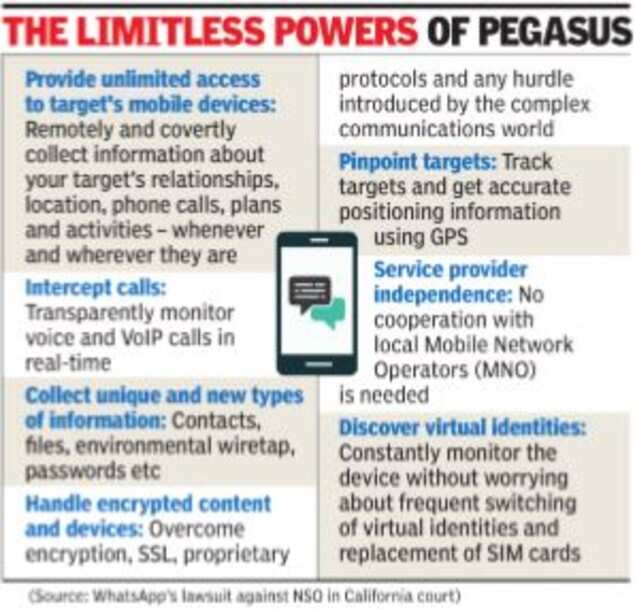Need surveillance reform, privacy law: Cyber experts
NEW DELHI: With spyware Pegasus raising privacy concerns globally, several cyber analysts and privacy experts have outlined the need for a surveillance reform and demanded a privacy law.
Digital rights activist Nikhil Pahwa posted on Twitter. "Good time to get a privacy law @rsprasad. Stop delaying it."
In a written statement, Internet Freedom Foundation said that there’s “a need for urgent surveillance reform to protect citizens against the use of malware, spyware and creation of vulnerabilities in technologies which offer privacy protection by design.”
"There is an urgent need for official disclosure on whether and how this spyware was used in India to hack our citizens... To the best of our understanding and knowledge, no such power exists under Indian law, and the pre-existing surveillance powers available under the Telegraph Act, 1885 and the Information Technology Act, 2000 do not permit the installation of spyware or hacking mobile devices,” IFF further said.

Hacking of computer resources, including mobile phones and apps, is in fact a criminal offence under the Information Technology Act, 2000, IFF wrote in it's statement, adding that it will "put forth a model draft law that provides for judicial oversight and parliamentary controls in the surveillance process." IFF is an India-based NGO that works to protect digital rights.
Access Now, an international advocacy group committed to promoting open and free internet, has issued a statement that “underscores the need to reform Indian surveillance practices and legal provisions”.
“Unfortunately, the government’s statement on Pegasus does not clarify whether any government agencies have dealt with NSO Group or its agents, nor whether they are in any way involved in the use of spyware. This is a crucial question for the government to answer, since NSO Group claims that it only transacts with governments and their agencies. If the government has not been involved, it must act to establish an independent inquiry into this incident and other related allegations of over-broad, illegal surveillance,” said the group’s policy director Raman Jit Singh Chima
India's Data Protection Bill, based on recommendations of the Justice B N Srikrishna Committee, was presented to the Ministry of Electronics and Information Technology on July 27, 2018. The Bill sought to protect individuals’ and their privacy, but it has still not been enacted into law.
"The NSO-Pegasus spyware is not a routine security flaw, or an issue with a specific product such as WhatsApp. It is about an unconstitutional and archaic surveillance regime in India which is unaccountable. This has progressively deteriorated to using malware," IFF executive director Apar Gupta posted on Twitter.
[1][2][3][4][5]
from India News | Latest News Headlines & Live Updates from India - Times of India https://ift.tt/2oI18Pi
Digital rights activist Nikhil Pahwa posted on Twitter. "Good time to get a privacy law @rsprasad. Stop delaying it."
In a written statement, Internet Freedom Foundation said that there’s “a need for urgent surveillance reform to protect citizens against the use of malware, spyware and creation of vulnerabilities in technologies which offer privacy protection by design.”
"There is an urgent need for official disclosure on whether and how this spyware was used in India to hack our citizens... To the best of our understanding and knowledge, no such power exists under Indian law, and the pre-existing surveillance powers available under the Telegraph Act, 1885 and the Information Technology Act, 2000 do not permit the installation of spyware or hacking mobile devices,” IFF further said.

Hacking of computer resources, including mobile phones and apps, is in fact a criminal offence under the Information Technology Act, 2000, IFF wrote in it's statement, adding that it will "put forth a model draft law that provides for judicial oversight and parliamentary controls in the surveillance process." IFF is an India-based NGO that works to protect digital rights.
Access Now, an international advocacy group committed to promoting open and free internet, has issued a statement that “underscores the need to reform Indian surveillance practices and legal provisions”.
“Unfortunately, the government’s statement on Pegasus does not clarify whether any government agencies have dealt with NSO Group or its agents, nor whether they are in any way involved in the use of spyware. This is a crucial question for the government to answer, since NSO Group claims that it only transacts with governments and their agencies. If the government has not been involved, it must act to establish an independent inquiry into this incident and other related allegations of over-broad, illegal surveillance,” said the group’s policy director Raman Jit Singh Chima
India's Data Protection Bill, based on recommendations of the Justice B N Srikrishna Committee, was presented to the Ministry of Electronics and Information Technology on July 27, 2018. The Bill sought to protect individuals’ and their privacy, but it has still not been enacted into law.
"The NSO-Pegasus spyware is not a routine security flaw, or an issue with a specific product such as WhatsApp. It is about an unconstitutional and archaic surveillance regime in India which is unaccountable. This has progressively deteriorated to using malware," IFF executive director Apar Gupta posted on Twitter.
[1][2][3][4][5]
References
- ^ surveillance reform (timesofindia.indiatimes.com)
- ^ privacy law (timesofindia.indiatimes.com)
- ^ Information Technology Act, 2000 (timesofindia.indiatimes.com)
- ^ NSO Group (timesofindia.indiatimes.com)
- ^ WhatsApp (timesofindia.indiatimes.com)
from India News | Latest News Headlines & Live Updates from India - Times of India https://ift.tt/2oI18Pi


Post a Comment